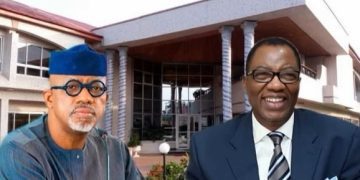By Jane Okafor, Abuja
ABUJA: In a novel and proactive move to safeguard his peace and ward off any harassment, the Lagos State Governor, Babajide Sanwo-Olu has asked the court to restrain the Financial Crimes Commission (EFCC) from arresting or prosecuting him at the end of his tenure May 29, 2027.
Sanwo-Olu claimed among other things in a fundamental rights enforcement suit, marked: FHC/ABJ/CS/773/2024 that political foes were goading the EFCC to arrest or prosecute him after handing over of power.
The suit was mentioned on Tuesday for hearing during which his lawyer, Darlington Ozurumba, told the court that he withdrew the earlier originating document he filed and replaced it with a new one.
Ozurumba claimed that the EFCC has been duly served with the fresh court document as required.
However, Lawyer to the EFCC, Hadiza Afegbua faulted Ozurumba and insisted that her client had not been served.
On inquiry, the presiding judge, Justice Joyce Abdulmalik discovered that there was no evidence that the document was served on the EFCC.
Justice Abdulmalik subsequently adjourned till November 11 for further mention, to allow Sanya-Olu to serve the EFCC.
In his originating application, the governor, who raised seven questions for the court’s determination, is seeking 11 reliefs.
He wants the court to declare that under and by virtue of the provisions of Section 37 of the 1999 Constitution, “the plaintiff, as a citizen of Nigeria, is entitled to right to private and family life as a minimum guarantee encapsulated under the Constitution of the Republic of Nigeria, 1999 before, during and after occupation of public office created by the Constitution.”
He wants the court to declare that under and by virtue of the provisions of Sections 43 and 44(1) of the 1999 Constitution, he is entitled to acquire, own, operate and manage both moveable and immovable property.
Such property, he said, include bank accounts, as a minimum guarantee encapsulated under the constitution either before, during and after leaving public office of governor of a state.
The governor is equally praying the court to declare that upon community reading of the provisions of Sections 35(1) & (4) and 41(1) of the constitution, the threat of his investigation, arrest and detention by the EFCC during his tenure of office as governor is illegal.
He wants the court to hold that the alleged plan by the EFCC to arrest him was unconstitutional and a flagrant violation of his fundamental right to personal liberty and freedom of movement as guaranteed under Sections 35(1) & (4) and 41(1) of the Constitution of the federal Republic of Nigeria, 1999 ( as amended).
According to the The Nation, the governor also wants the court to declare that the incessant harassment, threat of arrest and detention, against him upon the EFCC’s instigation by his political adversaries based on false and politically motivated allegation of corruption is a misuse of executive powers and abuse of public office.
He is also seeking a declaration that it as an unwarranted interference with his fundamental right to personal liberty, freedom of movement, fair hearing and equal protection of the law as guaranteed by the constitution and the Africa Charter on Human & Peoples’ Rights, CAP A9 LFN 2004.
Sanwo-Olu wants an order restraining the EFCC from harassing, intimidating, arresting, detaining, interrogating or prosecuting him in connection with his tenure as the governor of Lagos State.
He also seeking to prohibit and restrain the EFCC “from seizing the properties, the international passport and travel documents of the plaintiff or freezing the bank accounts of the plaintiff, his family members or in any other way to further breach the plaintiff’s fundamental rights guaranteed under the Constitution.”
Sanwo-Olu is also praying the court to issue an order restraining the EFCC from inviting, arresting or detaining him in connection with his tenure as governor of the state or breach his fundamental rights to personal liberty, fair hearing, private and family life, freedom of movement, acquisition of moveable and immoveable property as enshrined in the laws.
The governor stated, in a supporting affidavit, that as a way of getting at him the EFCC has commenced surreptitious plan to arrest some of his aides and family members based on the false and spurious allegations of diversion of funds.
He accused officials of the EFCC of mounting pressure on some of the aides of the governor to come forward and make incriminating statements against him.
He alleged that the anti-graft agency was also threatening to go after some contractors handling projects for the state government.
He said the agency was coercing them to make statements concerning spurious and false allegations of corruption against him as part of the moves to harvest materials for a trump up case against him.
“In a malicious attempt to get at the applicant, some of the plaintiff’s political adversaries in conjunction with some of the officials of the defendant are falsely ascribing to his administration of corrupt practices which are none existent.
“The EFCC, through some of its officials, were desperately inventing false, spurious and malicious allegations against the governor in order to use same as a basis for investigating, arresting and prosecuting the applicant after leaving office as governor,” he said.








































